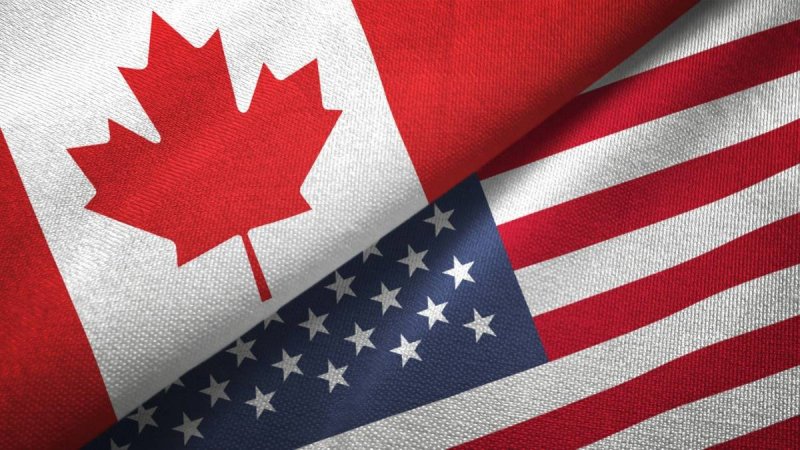For generations, the relationship between Canada and the United States has been characterized by a complex blend of proximity, trade, cultural exchange, and undeniable alliance. Yet, beneath the veneer of shared values and mutual interests, a simmering undercurrent of divergence has always existed. Today, that undercurrent appears to be growing stronger, with a noticeable shift in Canadian perceptions of their southern neighbor. Public opinion polls now reveal a nation increasingly divided on whether the U.S. can still be considered a true "ally," or if recent political and social developments have pushed it closer to the realm of an "enemy" country.
This evolving perspective is not simply a knee-jerk reaction to fleeting headlines. It represents a deeper, more profound reevaluation of the relationship, fueled by a confluence of factors, from political polarization south of the border to diverging approaches on crucial global issues. Understanding this division within Canada requires a closer examination of the historical context, the specific issues driving the wedge, and the potential implications for the future of the North American partnership.
A History of Coexistence and Unease
The Canadian-American relationship is a tapestry woven with threads of cooperation and contention. Bound together by the longest undefended border in the world, the two nations share a robust trading partnership, deeply intertwined economies, and a history of collaboration in areas like defense, security, and environmental protection. From the joint efforts during World War II to the North American Aerospace Defense Command (NORAD), the alliance has been a cornerstone of both countries' security strategies.
However, this cooperative narrative is punctuated by moments of friction and mistrust. Historically, Canadians have harbored concerns about American dominance, both economically and culturally. The overwhelming influence of American media and entertainment, coupled with the perceived threat of American economic and political power, has fueled a sense of national identity built, in part, on distinguishing themselves from their southern counterparts.
The anxieties often manifest in debates surrounding cultural sovereignty, protectionist trade policies, and differing approaches to social welfare. Canadians, generally more inclined towards social democracy and universal healthcare, have often viewed American individualism and limited government intervention with skepticism. This historical tension provides a crucial backdrop for understanding the current divide.
The Trump Era: A Catalyst for Change
The presidency of Donald Trump served as a major catalyst in exacerbating existing anxieties and fundamentally altering Canadian perceptions of the U.S. His "America First" policies, characterized by protectionist trade measures, withdrawal from international agreements like the Paris Climate Accord, and a confrontational approach to global diplomacy, directly challenged the principles that underpin the traditional Canadian-American alliance.
The imposition of tariffs on Canadian steel and aluminum under the guise of national security, for example, was seen by many Canadians as a betrayal of trust and a direct assault on their economy. The renegotiation of the North American Free Trade Agreement (NAFTA), resulting in the United States-Mexico-Canada Agreement (USMCA), further underscored the shifting power dynamics and the potential for American protectionism to harm Canadian interests.
Beyond economic policies, Trump's rhetoric and actions on the international stage alienated many Canadians. His skepticism towards multilateral institutions, his embrace of authoritarian leaders, and his divisive domestic policies, particularly on issues of race and immigration, clashed sharply with Canadian values and principles. The January 6th insurrection at the U.S. Capitol building further shocked and disturbed Canadians, raising serious questions about the stability of American democracy.
Beyond Trump: Enduring Concerns and Diverging Paths
While the change in administration in Washington D.C. has eased some of the immediate tensions, the underlying concerns remain. The deep political polarization within the United States, fueled by partisan media and social media echo chambers, continues to worry Canadians. The rise of right-wing extremism and the erosion of trust in democratic institutions raise fundamental questions about the future of American society and its role in the world.
Furthermore, Canada and the U.S. are increasingly diverging on crucial global issues. Climate change provides a stark example. While Canada has committed to ambitious climate targets and is actively investing in renewable energy, the U.S. faces significant internal resistance to climate action, particularly within the Republican party. This divergence has implications for bilateral cooperation on environmental issues and for the effectiveness of global efforts to combat climate change.
Gun control is another area of stark contrast. Canada has significantly stricter gun laws than the U.S., and the ongoing gun violence epidemic south of the border is a source of deep concern for Canadians. The inability of the U.S. to enact meaningful gun control measures, despite repeated tragedies, reinforces the perception that American society is fundamentally different and perhaps even incompatible with Canadian values.
The Divide Within Canada: Generational and Regional Differences
The debate over whether the U.S. is an ally or an enemy is not monolithic within Canada. Public opinion varies significantly based on factors such as age, region, and political affiliation. Younger Canadians, who have grown up witnessing the tumultuous events of the past decade, tend to be more skeptical of the U.S. than older generations who remember a more stable and predictable relationship.
Regionally, Western Canadians, who have historically had stronger economic ties to the U.S., may view the relationship differently than those in Quebec, where cultural and linguistic differences have often fostered a greater sense of distance from American society.
Political affiliation also plays a significant role. Supporters of the Liberal Party, traditionally more aligned with international cooperation and progressive values, are more likely to express concerns about the direction of the U.S. than those who align with the Conservative Party, which often emphasizes closer ties with the U.S. on issues of trade and security.
Implications for the Future
The growing division within Canada regarding the U.S. has significant implications for the future of the relationship. It could lead to a recalibration of Canadian foreign policy, with a greater emphasis on diversifying trade relationships and strengthening ties with other allies around the world. Canada may also become more assertive in advocating for its interests on the global stage, even when those interests diverge from those of the U.S.
Domestically, the shifting perceptions of the U.S. could influence electoral outcomes and shape the political discourse. Parties that are perceived as being too closely aligned with the U.S. may face challenges in appealing to a growing segment of the Canadian population that is increasingly wary of American influence.
Ultimately, the future of the Canadian-American relationship will depend on the ability of both countries to navigate the challenges of a changing world. Restoring trust, fostering mutual respect, and finding common ground on issues of mutual concern will be crucial for maintaining a strong and productive partnership. However, the current divide within Canada serves as a stark reminder that the assumptions of a shared future can no longer be taken for granted. The relationship requires constant nurturing and a willingness to acknowledge and address the growing divergence in values and priorities. Whether the U.S. can regain its standing as a trusted ally in the eyes of all Canadians remains to be seen, but the path forward will undoubtedly require a significant effort on both sides of the border.
Word Count: 1,245

Tracie Higgins
Tracie Higgins, a professional content writer, produces captivating content. In her leisure time, away from work and travel, she loves to spend time with her grandson.






Leave a comment?
To write a comment, you must login or register first.